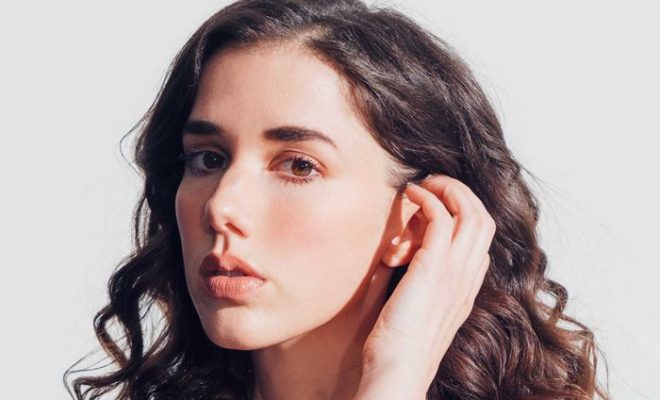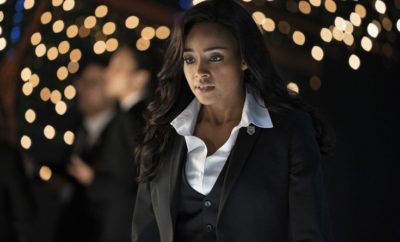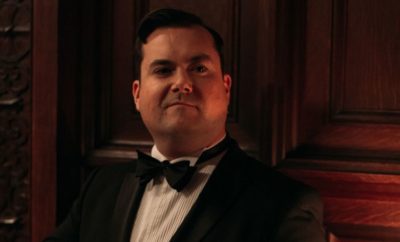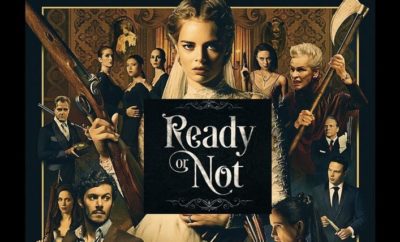
Interviews
Erica Dasher – Guidance
By: Lindsay Flanagan
Q: You went to the University of Southern California to study becoming a filmmaker and producer— so how did you end up being in front of the camera? How did you end up deciding that maybe you wanted to act?
A: It’s funny because I was actually studying theater and philosophy there so I was acting, but I took off a year—what would have been my Senior year—and started making this documentary and so shot for a year then came back to finish my degree. I was there and hung out with the film kids and had every intention of solely being behind the camera, even though I acted my whole life, and it’s something that I really love. I think there was part of me that was like, “I wonder what differentiates me.” I think the sheer probability of it made me a little fearful. And I really do like all parts of filmmaking, but I was very fortunate to get into the showcase at the end of my Senior year. USC has a showcase for their Bachelor of Fine Arts students and I was BA because I was studying more than one thing. So, they only have three spots for the BA and you have to audition and there is like 200 kids. I was very fortunate to get one of those spots. They invite a bunch of agents and managers and industry people to watch us perform different scenes. I got representation out of that. So, I was very fortunate to get repped out of school and was able to start auditioning pretty much right away.
Q: Your “big break,” so to speak, was with “Jane by Design.” Even though the show ended up being canceled, it had a lot of viewers and it garnered you a lot of fans. What would you say you miss most about “Jane by Design?” Is it the character? Is it the people you worked with?
A: The people I worked with were amazing. Nick Roux and I have stayed very close friends. He played Billy on the show. The showrunner April Blair and I have stayed very close friends. We were a very tight-knit cast. Andie [MacDowell] became like a second mother to me. She started me directing. I was producing, but for whatever reason Andie had this sheer blind faith in me that I could be a director. She introduced me to her daughter Rainey, who I ended up doing some music videos for. She was like, “You’re going to direct for my daughter” and I was like, “Oh, okay!” Rainey and I went to lunch and I pitched her some ideas and we really vibed and from there we worked together and I did her very first music video—and it was my very first music video—and it ended up being very successful. I very much credit Andie with kicking my directing career off.
Q: I knew you had directed some of Rainey’s music videos and that is actually one of the questions I had. You directed “Turn Me On Like the Radio” and “Me and Johnny Cash.” The music videos are very creative and I was very impressed by them. My question was what inspired you to work together, but you already answered that! Is there anything you want to add?
A: Andie just really thought that there was some sort of commonality there and she was an amazing producer. She paired two people together that got on and it ended up being successful. It was such a pleasure. She’s so easy to work with and I’ve gone on to now—it’s a career that I have. I have directing reps. I direct all the time now. It’s a very big part of my identity and something I want to continue doing for the rest of my life. It’s wonderful.
Q: You didn’t direct the documentary Figures of Speech, but you wrote and produced it, correct?
A: That’s a little bit of a complicated thing. So we shot for a year—my best friend and I—on our own and then we brought on our director after we shot the movie. You know, documentaries are very much built in the edit. We ended up with 400 hours of footage and had to carve 90 minutes. But we were very much a part of the process every step of the way, but wanted to give appropriate credit to our editor and director because he really helped us carve that story out of that massive amount of footage.
Q: What was your inspiration behind writing Figures of Speech?
A: My best friend, Sami Kriegstein, who’s the other producer, and I met when we were thirteen years old at speech and debate camp. We were both hard-core speech kids—very nerdy. Speech camp is a step above or below band camp, depending on who you ask. It was an activity that we did throughout middle school and high school. We went to camp and we taught and it sort of fundamentally made us who we are. I think it’s why I’m so interested in all parts of storytelling or filmmaking because you’re taking bits of published literature, you’re editing them, you’re deciding which sort of bias you’re telling the story from in terms of the character or you’re performing them and you’re competing with them. So, it’s really sort of a wonderful, intensive process. It’s very fun. The movie is very much a love letter to an activity we both did growing up.
Q: In your current project “Guidance” you play the lead role of the guidance counselor, Alana. What drew your interest to be involved in this project?
A: I got an audition for the project and I was out of town and so I came in and I got three of the scripts in advance. I read all of three scripts and I tore through them very quickly. I really liked them so I decided to put myself on tape for it—to send an audition tape in. The character is so not me. She’s so far from me—her experiences are so different from mine. I like to challenge myself and so I put the audition on tape and I sent it in. The next day I got a call from the show owner and creator, SJ Hodges, and we discussed the character and I sent her another thing and then I was hired and we were shooting days later.
Alana is a really interesting character because she was diagnosed on the spectrum [Autism spectrum disorder] when she was eight—very young, younger than that—and then she was in eight years of ABA—Applied Behavioral Analysis—which is sort of a training that helps autistic people function better in a neurotypical world. It’s actually become a very controversial bit of training, but Alana had it when she was much younger. So, to take a person like that and to put her in the position of a guidance counselor that needs to connect and empathize with kids who are different from herself—it’s a very complexed, nuanced character and I wanted to be a part of the project.
All of the characters, really, on “Guidance” are that way. Everybody has a very three dimensional back story. It’s such a diverse cast. It just seems to be such a special and relevant show right now.
Q: It really is. The series is mostly told from Alana’s point-of-view and I was going to ask why do you think it’s important that these types of stories are told from an adult’s POV? I mean, we do get the teens’ POV, but also the adults because it’s not a typical teen drama.
A: That’s an interesting question. I think for this piece the guidance counselor is just a very unique device because they are connecting with each kid separately and they have almost an objective POV, although she becomes a little more biased over the course of the season. But the guidance counselor has an objective view of these kids’ situations and so we get these intimate, behind-the-scenes peeks at each character through her eyes. She ends up being a very interesting spine for the show.
Q: High school being what it is—some people loved it, some people hated it—and I might be generalizing here—but I think the experiences in high school in particular say with them, either consciously or sub-consciously.
A: Oh, absolutely.
Q: In the first season, Anna, played by Michelle Trachtenberg, [the high school experience] seems to affect her counseling because she was pretty scarred by it. So do you think this affects Alana as well? What are your thoughts on it—why the creators would have taken that angle? There’s this really interesting character—a guidance counselor who still has things from her past that are haunting her and she’s trying to help the kids. How does Alana handle things like that?
A: I think, of course, this is going to affect her. The season starts with a school shooting. That ends up being a very twisted rabbit hole that we fall down. I think, absolutely, anything traumatic is going to shape you. I think the interesting thing about watching shows is you get to see pressure and conflict applied to characters and when pressure is applied, that’s when you know what kind of person they are. So, for Alana she does make some mistakes, but I think her heart is in the right place. So, hopefully, she’ll be able to live with herself at the end of the day.
The show is interesting because each season is dealing with a different sort of scandal, so to say. But they are real things, unfortunately. Especially the shooting is very relevant—unfortunately relevant.
Q: The first season dealt with cyberbullying and then this season is dealing with a shooting. I think it’s important and I’d like to know you what think, too, about why we’re addressing these types of things for kids in shows today. I don’t recall seeing anything like that when I was a kid.
A: Me either.
Q: The Outsiders dealt with a lot of things, with homeless kids, things like that. But I think that in shows and literature—it’s important for kids to see. I think it’s awesome you’re involved in something like that. I guess the question is why do you think that’s important to show?
A: I have a really heavy answer to this. Magical thinking has become a big part of the psyche, at least in LA. Self-help is a huge billion dollar industry. And I do think positive thinking can be helpful. And I think that’s true, in part. But I think that, like anything, people can take things too far and if we become unwilling to confront things that are actually happening I think that’s when they are doomed to repeat. I think awareness is always the first step. So if you can put a show together where you’re dealing with dark and difficult things and you’re humanizing all of the people around them and it’s both scary and life affirming, you’re doing your job as an artist.
Q: Season One and Season Two have different story lines, but have the same sort of idea. If some of our readers haven’t watched Season One—of course you want to have them watch Season One—but would you say it’s necessary to watch or can they jump in right with Season Two?
A: No, they can totally jump in with Season Two. It’s very much an anthology show. This season we had different writers, different directors, different actors, different everything. It’s a different school, different themes—all of that stuff. You can watch Season One second and Season Two first!
Q: What can we expect from Erica in the future? Will we get to see you writing and directing more documentaries, more music videos, more acting?
A: Yeah, more acting, hopefully. You sort of aren’t in control of that as an actor, but I think I was in a place after “Jane.” And because I wanted to finish the documentary, I was passing on projects because I wanted to finish this sort of passion project of my own and I’m not really in that place anymore. I’m very open to different kinds of acting work. I have a few music videos that will be coming out soon. I have a fashion film and I’m going to continue doing that stuff, hopefully commercials and things like that. But the big things I want to do—I’ve written a couple shows and one that I’m working on now that I really love that I’d love to sell and be in. Also, there is a narrative film that I’m sort of in pre-production on. I’m trying to integrate acting and writing and directing all in one place, I guess is the best answer.





You must be logged in to post a comment Login